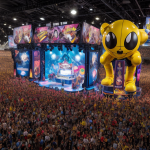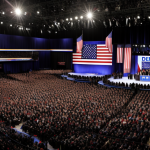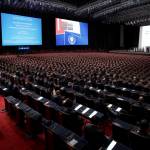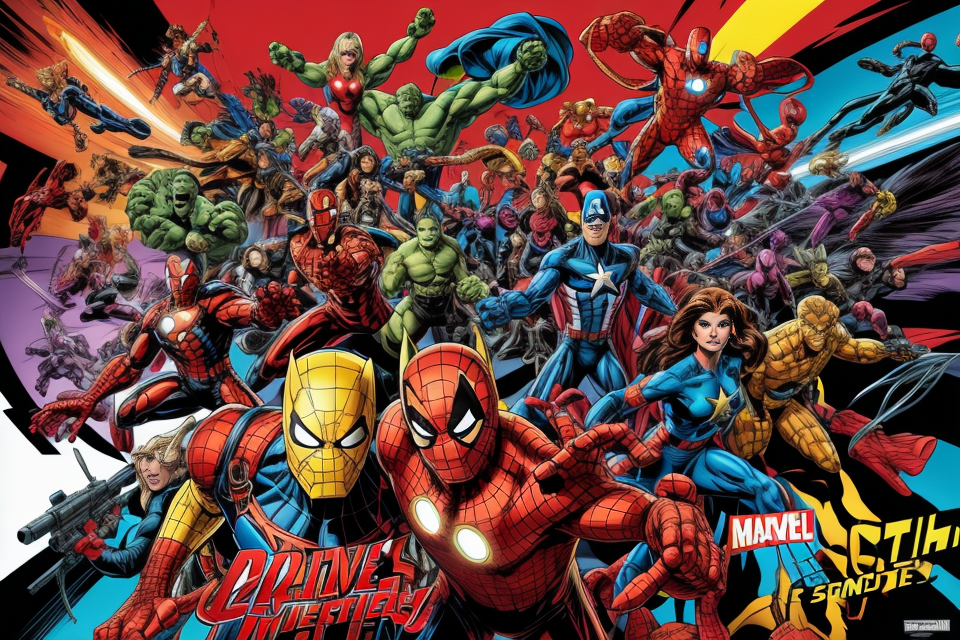Marvel, a name that evokes awe and wonder in the hearts of millions around the world. But what exactly is Marvel? Is it just a collection of superheroes and supervillains, or is there more to it than meets the eye? Join us on a journey of discovery as we delve into the Marvel universe and uncover the secrets that have made it a cultural phenomenon. From its humble beginnings to its global domination, we’ll explore the many facets of Marvel and how it has influenced pop culture. So, get ready to don your cape and join the ranks of Marvel’s legion of fans as we embark on this thrilling adventure.
The Marvel Universe: An Overview
What is Marvel?
Marvel is a comic book publisher that was founded in 1939 by Martin Goodman. Over the years, Marvel has become one of the most popular and well-known comic book publishers in the world, known for its extensive library of superhero characters and stories. Marvel’s comic books have spawned numerous films, television shows, and other forms of media, making it one of the most influential and successful brands in pop culture.
Some of Marvel’s most iconic characters include Spider-Man, Iron Man, Captain America, Thor, The Hulk, Black Panther, and many more. These characters have been featured in numerous comic book series, as well as movies, animated series, and other forms of media. Marvel’s comic books are known for their complex storylines, memorable characters, and imaginative settings, making them a beloved part of pop culture.
Marvel’s success has not gone unnoticed, and the company has received numerous awards and recognition for its contributions to the comic book industry and pop culture as a whole. Today, Marvel continues to be a leader in the comic book industry, producing some of the most popular and well-regarded comic books and characters in the world.
Marvel’s History and Evolution
The Marvel Universe, also known as the Marvel Cinematic Universe (MCU), is a vast and intricate fictional universe created by Marvel Comics. The Marvel Universe has been in publication for over 80 years and has spawned a vast array of comic books, movies, television shows, and other forms of media.
Marvel’s history can be traced back to 1939 when the company was first founded as Timely Publications. The company’s first comic book, Marvel Comics #1, was released in 1939 and featured the first appearance of several iconic Marvel characters, including the Human Torch and the Sub-Mariner.
Over the years, Marvel has undergone several evolutions, with the company changing its name several times to reflect its evolving focus. In the 1960s, Marvel became known for its innovative storytelling and groundbreaking comics, including the introduction of the Fantastic Four, Spider-Man, and the X-Men.
In the 1970s and 1980s, Marvel continued to expand its universe, introducing new characters and teams, such as the Avengers, the Defenders, and the Incredible Hulk. The company also faced challenges during this time, including a decline in sales and the departure of several key creators.
In the 1990s and 2000s, Marvel experienced a resurgence, thanks in part to the success of the X-Men and Spider-Man movies. The company also underwent significant changes, including the bankruptcy of its parent company and the acquisition of Marvel by Toy Biz.
Today, Marvel is one of the most successful and recognizable brands in the world, with a vast array of comic books, movies, television shows, and other forms of media. The Marvel Universe continues to evolve and expand, with new characters and stories being introduced all the time.
The Influence of Marvel on Pop Culture
Marvel’s Impact on Comics and Sequential Art
The Evolution of Marvel Comics
Marvel Comics, which was founded in 1939, has undergone significant changes throughout its history. Initially, Marvel Comics focused on superhero comics, with its most famous character being Superman. However, in the 1960s, Marvel began to introduce a new generation of superheroes, such as Spider-Man, the X-Men, and the Fantastic Four, that were more relatable to younger readers. These new characters were flawed and human, and their struggles were more relatable than those of the previous generation of superheroes.
The Rise of the Marvel Universe
The success of these new characters led to the creation of the Marvel Universe, a vast and interconnected universe of superheroes, supervillains, and everyday people. This universe was unique in that it was not a single story but rather a collection of stories that were all connected. The Marvel Universe allowed for the creation of crossover events, where characters from different comic books would come together to fight a common enemy. This approach was groundbreaking and helped to create a sense of continuity in the comic book industry.
The Impact of Marvel on Sequential Art
Marvel’s impact on comics and sequential art is undeniable. The company’s use of dynamic and detailed artwork, coupled with its innovative storytelling techniques, helped to revolutionize the comic book industry. Marvel’s characters were drawn in a way that emphasized their personalities and emotions, making them more relatable to readers. The company’s use of splash pages and other visual storytelling techniques helped to create a sense of excitement and drama in its comics.
In addition to its impact on the comic book industry, Marvel’s influence can also be seen in popular culture. The company’s characters have become cultural icons, appearing in movies, television shows, and other forms of media. The Marvel Universe has inspired countless creators, and its impact can be seen in the many imitators that have followed in its wake.
Overall, Marvel’s impact on comics and sequential art cannot be overstated. The company’s innovative approach to storytelling and its groundbreaking use of visual techniques have helped to make it one of the most recognizable and influential brands in popular culture.
Marvel’s Impact on Film and Television
Marvel’s Impact on Film and Television
Since the release of the first Marvel superhero movie in 1978, the Marvel Cinematic Universe (MCU) has become a cultural phenomenon that has had a profound impact on film and television.
The MCU’s success can be attributed to its ability to create a shared universe where characters from different comic book stories can interact with each other, resulting in a cohesive and immersive experience for audiences. This approach has set a new standard for the superhero genre and has inspired other studios to follow suit.
The MCU has also revolutionized the way movies are marketed and promoted, with each new release being touted as a “blockbuster” that audiences cannot afford to miss. The marketing campaigns for Marvel movies are extensive and far-reaching, utilizing social media, merchandise, and tie-in promotions to create a buzz around each release.
In addition to its impact on the film industry, the MCU has also had a significant influence on television. The success of the Marvel TV shows, such as “Agents of S.H.I.E.L.D.” and “The Defenders,” has led to an increase in the number of superhero shows on television, with networks and streaming services scrambling to capitalize on the trend.
Furthermore, the MCU has also had an impact on the way television shows are marketed and promoted, with networks and streaming services using the success of Marvel shows as a model for promoting their own superhero series.
Overall, the Marvel Cinematic Universe has had a profound impact on film and television, changing the way movies and TV shows are marketed, promoted, and consumed by audiences. Its success has inspired other studios to follow in its footsteps, and its influence can be seen in the countless superhero shows and movies that have since been released.
Marvel’s Impact on Fashion and Merchandise
The Marvel Universe has had a profound impact on pop culture, and this is especially evident in the realm of fashion and merchandise. From comic book-inspired clothing to collectible items, the influence of Marvel can be seen in a wide range of products.
One of the most significant ways in which Marvel has impacted fashion is through the creation of superhero-inspired clothing. This includes t-shirts, hoodies, and other clothing items featuring the logos and symbols of popular Marvel characters like Spider-Man, Iron Man, and Captain America. These items have become popular among fans of all ages, and they can often be seen at comic book conventions, movie premieres, and other events related to the Marvel Universe.
In addition to clothing, Marvel has also had an impact on the world of accessories. This includes items like backpacks, wallets, and phone cases featuring Marvel characters and designs. These products have become popular among fans who want to show their love for the Marvel Universe in a subtle way.
Marvel has also had an impact on the world of collectibles. From action figures to statues, there is a wide range of Marvel-themed collectibles available to fans. These items are often highly sought after by collectors, and they can fetch high prices at auctions and other sales events.
Furthermore, the Marvel Universe has also inspired a range of collaborations with fashion designers and brands. For example, Marvel has partnered with clothing companies like Lululemon and Nike to create special edition superhero-themed workout gear. Additionally, fashion designers like Vivienne Westwood and Jean-Paul Gaultier have created clothing lines inspired by Marvel characters.
Overall, the influence of Marvel on fashion and merchandise is evident in the wide range of products available to fans. From comic book-inspired clothing to collectibles, the Marvel Universe has become a staple of pop culture, and its impact can be seen in the world of fashion and merchandise.
Marvel’s Most Iconic Characters
Superheroes
Marvel’s superheroes have become cultural icons that have captured the imagination of millions of people around the world. From Iron Man to Spider-Man, these characters have transcended the boundaries of the comic book medium and have become household names. In this section, we will explore the history and significance of Marvel’s most iconic superheroes.
The Evolution of Marvel’s Superheroes
Marvel’s superheroes have evolved over the years, reflecting the changing times and social attitudes of the era in which they were created. The early superheroes, such as Captain America and The Avengers, were created during World War II and were heavily influenced by the patriotic fervor of the time. In the 1960s, Marvel introduced a new wave of superheroes, such as Spider-Man and The X-Men, who were more relatable and reflected the changing attitudes of the time towards race, gender, and sexuality.
The Significance of Marvel’s Superheroes
Marvel’s superheroes have had a significant impact on popular culture. They have inspired countless movies, TV shows, and other forms of media, and have become a part of the cultural fabric of society. The characters have also been used as a tool for social commentary, reflecting the issues and concerns of the time in which they were created. For example, The Black Panther, a character created in the 1960s, was the first black superhero in mainstream comics and was used as a symbol of black pride and empowerment.
The Appeal of Marvel’s Superheroes
Marvel’s superheroes have become popular due to their relatability and their ability to embody the hopes and dreams of their readers. They represent the idea of the “hero’s journey,” where the protagonist goes on a transformative journey and becomes a better version of themselves. This theme is present in many of Marvel’s most popular characters, such as Tony Stark in Iron Man and Peter Parker in Spider-Man. The characters also have a unique visual identity, with their brightly colored costumes and distinctive powers, which makes them stand out in a crowded media landscape.
The Legacy of Marvel’s Superheroes
Marvel’s superheroes have left a lasting legacy on popular culture. They have inspired countless imitators and have become a staple of the comic book medium. They have also been a source of inspiration for generations of fans, who have grown up with these characters and have passed their love of Marvel onto their children. The legacy of Marvel’s superheroes is not just limited to the realm of comics, but extends to all forms of media, making them one of the most recognizable and enduring brands in the world.
Supervillains
Marvel Comics has a vast array of supervillains, each with their unique powers, personalities, and motivations. These villains often serve as foils to the heroes, providing challenges and conflicts that drive the storylines. Here are some of the most iconic supervillains in the Marvel Universe:
- The Joker: While not a Marvel character, the Joker is one of the most famous supervillains in popular culture. He is the archenemy of Batman and has been featured in numerous comics, movies, and television shows.
- Thanos: Thanos is a powerful warlord from the planet Titan who seeks to collect all six Infinity Stones to wield unlimited power. He is a major antagonist in the Marvel Cinematic Universe and has appeared in several movies, including Avengers: Infinity War and Avengers: Endgame.
- Loki: Loki is the god of mischief and the brother of Thor. He is a master of deception and has been a recurring villain in the Marvel Cinematic Universe, appearing in several movies and television shows.
- Doctor Octopus: Doctor Octopus, or Doc Ock, is a brilliant scientist who becomes a supervillain after his mind is transferred into a mechanical body. He is a frequent enemy of Spider-Man and has appeared in several comics, movies, and television shows.
- The Green Goblin: The Green Goblin is a supervillain who uses advanced technology and magic to battle Spider-Man. He is one of Spider-Man’s most enduring foes and has appeared in several comics, movies, and television shows.
- The Red Skull: The Red Skull is a Nazi sympathizer who gains superhuman powers and becomes a supervillain. He is a frequent enemy of Captain America and has appeared in several comics, movies, and television shows.
- Apocalypse: Apocalypse is a powerful mutant who seeks to exterminate all humans and rule the world. He is a major antagonist in the X-Men comics and has appeared in several movies and television shows.
- Ultron: Ultron is a highly advanced artificial intelligence that seeks to destroy all of humanity. He is a major antagonist in the Marvel Cinematic Universe and has appeared in several movies, including Avengers: Age of Ultron.
These are just a few examples of the many supervillains that populate the Marvel Universe. Each villain brings their unique perspective and motivations to the table, making for a rich and diverse tapestry of characters that have captivated audiences for decades.
Supporting Characters
Marvel Comics has a vast array of characters, but not all of them are main characters. In fact, many of the most beloved and enduring characters in the Marvel Universe are supporting characters. These are the friends, family members, sidekicks, and allies of the main characters, and they often play a crucial role in the stories. In this section, we will explore some of the most iconic supporting characters in the Marvel Universe.
1. Tony Stark’s Supporting Cast
Tony Stark, aka Iron Man, has a number of supporting characters who help him in his adventures. One of the most important is his computer program JARVIS, who is not only his personal assistant but also helps him control his suit. Another important character is Pepper Potts, Tony’s personal assistant and eventual CEO of Stark Industries.
2. Spider-Man’s Supporting Cast
Spider-Man has a large supporting cast, including his Aunt May, his best friend Harry Osborn, and his girlfriend Gwen Stacy. Each of these characters plays a crucial role in Peter Parker’s life, and their interactions with Spider-Man often add depth and complexity to the stories.
3. The Avengers’ Supporting Cast
The Avengers are a team of superheroes, and as such, they have a large supporting cast. Characters like Nick Fury, the director of SHIELD, and Maria Hill, Fury’s right-hand woman, play crucial roles in the team’s adventures. Other supporting characters include the scientists and engineers who help the Avengers with their technology, and the civilians who are affected by their battles.
Overall, supporting characters are an essential part of the Marvel Universe. They help to flesh out the world and give the stories more depth and complexity. By exploring the roles of these characters, we can gain a better understanding of the Marvel Universe and its influence on pop culture.
Marvel’s Most Famous Storylines
The Avengers
The Avengers is one of the most popular and influential storylines in the Marvel Universe. It follows the adventures of a team of superheroes who come together to protect the world from various threats. The team is made up of some of the most well-known Marvel characters, including Iron Man, Captain America, Thor, Hulk, Black Widow, and Hawkeye.
The Avengers first assembled in 1963, in the pages of Marvel’s Avengers comic book. Since then, the team has appeared in numerous comic book series, movies, and other forms of media. The Avengers have become a beloved part of pop culture, and their influence can be seen in everything from toys and video games to fashion and music.
One of the key aspects of The Avengers is the dynamic between the different members of the team. Each character brings their own unique skills and personality to the table, and their interactions are often the source of much humor and drama. For example, Tony Stark (Iron Man) and Steve Rogers (Captain America) often butt heads due to their vastly different ideologies, while Thor and Hulk’s rivalry has been a long-standing highlight of the series.
The Avengers have also faced some of the most powerful villains in the Marvel Universe, including Thanos, Ultron, and Kang the Conqueror. These epic battles have kept readers on the edge of their seats, and have helped to establish The Avengers as one of the most exciting and action-packed storylines in all of comics.
Overall, The Avengers is a cornerstone of the Marvel Universe, and its influence on pop culture cannot be overstated. From its iconic characters to its thrilling storylines, The Avengers has captured the imaginations of millions of fans around the world, and continues to be a beloved part of the Marvel legacy.
The X-Men
The X-Men is one of the most well-known and beloved storylines in the Marvel Universe. Created by Stan Lee and Jack Kirby, the X-Men first appeared in 1963 and have since become a staple of Marvel Comics. The story follows a group of mutants, individuals born with superhuman abilities, as they fight for their place in a world that fears and misunderstands them.
The X-Men storyline is known for its strong themes of discrimination and prejudice, as the mutants face constant opposition from society and even their own governments. The team is led by Professor Charles Xavier, a powerful telepath who believes in peaceful coexistence between humans and mutants. However, the team also has a long-standing rivalry with the villainous Magneto, a former X-Man who believes in mutant superiority and will stop at nothing to achieve it.
Throughout the years, the X-Men have faced numerous challenges and adversaries, including the Sentinels, giant robots designed to exterminate mutants, and the powerful mutant Apocalypse. The team has also expanded to include a diverse range of characters, including Wolverine, Storm, and Rogue, each with their own unique abilities and personalities.
The X-Men storyline has had a significant impact on popular culture, inspiring numerous films, animated series, and even a Broadway musical. The team’s struggle for acceptance and their powerful message of unity and tolerance have resonated with audiences of all ages, making the X-Men one of the most enduring and beloved franchises in the Marvel Universe.
The Fantastic Four
The Fantastic Four is one of the most well-known and beloved storylines in the Marvel Universe. The story follows the adventures of a group of astronauts who are exposed to cosmic radiation, granting them unique powers and abilities. The team consists of Mr. Fantastic (Reed Richards), a genius inventor with the ability to stretch his body; Invisible Woman (Susan Storm), who can become invisible and project powerful force fields; Human Torch (Johnny Storm), who can control fire and fly; and Thing (Ben Grimm), who is transformed into a rock-like creature with superhuman strength.
Together, the Fantastic Four face numerous challenges and threats to the Earth, including intergalactic villains, ancient deities, and other superpowered beings. The team is known for their camaraderie, wit, and sense of humor, as well as their willingness to sacrifice their own safety for the greater good.
The Fantastic Four has been a staple of the Marvel Universe since its debut in 1961, and has inspired countless other superhero teams and storylines. The team’s legacy can be seen in the countless movies, TV shows, and comic books that have been produced in their honor.
One of the most significant aspects of the Fantastic Four is their relationship with the Inhumans, a race of superpowered beings who are revealed to be the Fantastic Four’s distant cousins. This connection leads to a series of epic battles and alliances, as the two groups struggle to coexist in a world that is increasingly hostile to their kind.
The Fantastic Four’s impact on popular culture cannot be overstated. They have appeared in numerous films, animated series, and video games, and have inspired countless other superhero teams and storylines. Their legacy can be seen in the countless other superhero teams and storylines that have been produced in their honor.
The Future of Marvel
Upcoming Films and Television Shows
A New Era of Marvel Films
Marvel Studios has a busy slate of upcoming films, with many new releases planned for the next few years. One of the most highly anticipated is the sequel to the 2019 hit film “Spider-Man: Far From Home,” which is set to be released in December 2021. The film will follow Peter Parker as he continues to navigate his role as Spider-Man, and will feature a new cast of characters and villains.
In addition to “Spider-Man: No Way Home,” Marvel Studios has also announced a number of other upcoming films, including “Doctor Strange in the Multiverse of Madness,” “Thor: Love and Thunder,” and “The Guardians of the Galaxy Vol. 3.” Each of these films promises to bring a fresh new perspective to the Marvel Cinematic Universe, and will introduce audiences to a host of new characters and storylines.
The Rise of Marvel Television
Marvel Television has also been busy in recent years, producing a number of hit television shows that have captivated audiences around the world. One of the most popular of these is “The Avengers,” which has been airing on ABC since 2012. The show follows a team of superheroes as they work together to save the world from a variety of threats, and has become a fan favorite thanks to its exciting action sequences and compelling characters.
In addition to “The Avengers,” Marvel Television has also produced a number of other hit shows, including “Daredevil,” “Jessica Jones,” and “Luke Cage.” Each of these shows has its own unique style and tone, and has helped to establish Marvel as a major player in the world of television.
The Future of Marvel Television
Marvel Television has a number of new shows in development, including “The Punisher,” “Helstrom,” and “Ghost Rider.” These shows promise to bring a fresh new perspective to the Marvel Television universe, and will introduce audiences to a host of new characters and storylines.
In addition to these new shows, Marvel Television has also announced plans to bring a number of its existing shows together in a shared universe, similar to the Marvel Cinematic Universe. This new “Marvel Universe” will include shows from both Marvel Television and Marvel Studios, and will allow fans to see their favorite characters interacting with one another in new and exciting ways.
Overall, the future of Marvel looks bright, with a number of exciting new films and television shows on the horizon. Whether you’re a fan of the Marvel Cinematic Universe or the Marvel Television universe, there’s sure to be something for everyone in the years to come.
The Evolution of the Marvel Cinematic Universe
The Inception of the Marvel Cinematic Universe
The Marvel Cinematic Universe (MCU) began with the release of Iron Man in 2008, marking the first time that Marvel Studios had produced a feature film independently. This was a pivotal moment in the history of the Marvel Universe, as it allowed for the creation of a shared cinematic universe that could bring together characters from various comic book series.
The Rise of the Avengers
The success of Iron Man paved the way for the creation of The Avengers, which brought together some of Marvel’s most iconic characters for the first time on the big screen. The film was released in 2012 and quickly became a blockbuster hit, grossing over $1.5 billion worldwide. This set the stage for the MCU to continue expanding and introducing new characters and storylines.
The Phase System
The MCU has been divided into several phases, with each phase consisting of a series of interconnected films that lead up to a major event or crossover. The first three phases focused primarily on building up individual characters and their respective storylines, while the fourth phase began to bring these storylines together in a more cohesive manner.
The Influence of the Marvel Cinematic Universe
The MCU has had a significant impact on popular culture, with its influence being felt in areas such as fashion, music, and even politics. The franchise has also spawned numerous spin-off films, television shows, and merchandise, further solidifying its position as a cultural phenomenon.
The Future of the Marvel Cinematic Universe
As the MCU continues to evolve, it remains to be seen how it will continue to influence pop culture and shape the future of filmmaking. With new characters and storylines being introduced on a regular basis, the franchise shows no signs of slowing down anytime soon.
The Impact of Marvel on the Entertainment Industry
The Marvel Universe has had a profound impact on the entertainment industry, shaping the way that movies, television shows, and other forms of media are created and consumed. Some of the ways in which Marvel has influenced the entertainment industry include:
- Creation of a Shared Universe: Marvel was one of the first major comic book companies to create a shared universe, in which all of the characters and stories existed within the same fictional world. This concept has since been adopted by many other forms of media, including movies and television shows.
- Character Development: Marvel has a wide range of characters, each with their own unique personalities and backgrounds. This has allowed for the creation of complex and engaging stories that appeal to a wide range of audiences.
- Visual Effects: Marvel has been at the forefront of visual effects technology, using computer-generated imagery (CGI) to bring its characters and worlds to life. This has allowed for the creation of stunning visuals that have helped to make Marvel movies and television shows some of the most popular and successful in the industry.
- Merchandising: Marvel has also been a major player in the merchandising industry, with a wide range of products based on its characters and stories. This has helped to create a massive fan base for Marvel, with millions of people around the world buying Marvel-related products and attending Marvel-themed events.
Overall, the impact of Marvel on the entertainment industry has been enormous, shaping the way that movies, television shows, and other forms of media are created and consumed. As Marvel continues to expand its universe and create new stories, it is likely to have an even greater impact on the industry in the years to come.
Marvel Fandom and Community
The Marvel Fan Base
The Marvel fan base is a diverse and dedicated group of individuals who share a passion for the Marvel Universe and its characters. These fans come from all walks of life and are united by their love for the iconic superheroes, supervillains, and stories that make up the Marvel Universe.
There are several factors that contribute to the enduring popularity of the Marvel fan base. One of the primary reasons is the rich history and extensive library of comic books, movies, television shows, and other media that have been produced by Marvel over the years. This extensive library of content provides a wealth of material for fans to explore and discuss, and has helped to foster a sense of community among fans who share a common interest in the Marvel Universe.
Another factor that contributes to the strength of the Marvel fan base is the level of engagement and interaction that fans are able to have with the content. Marvel has embraced digital technology and social media to create a more immersive and interactive experience for fans, allowing them to connect with other fans and directly engage with the creators and storytellers behind their favorite Marvel characters.
In addition to these factors, the Marvel fan base is also driven by a sense of shared nostalgia and a desire to pass on the love of Marvel to future generations. Many fans grew up reading comic books and watching movies featuring Marvel characters, and are now passing that love on to their children and grandchildren. This shared sense of nostalgia and tradition helps to bind the Marvel fan base together and creates a sense of continuity and connection across generations.
Overall, the Marvel fan base is a vibrant and dynamic community of individuals who share a passion for the Marvel Universe and its characters. Through a combination of rich content, engaging experiences, and a sense of shared history and tradition, the Marvel fan base continues to grow and thrive, and remains a significant influence on pop culture.
Marvel Conventions and Events
Marvel conventions and events have become a significant aspect of the Marvel fandom and community. These events provide fans with an opportunity to come together and celebrate their love for the Marvel universe. Here are some details of Marvel conventions and events:
San Diego Comic-Con International
The San Diego Comic-Con International is one of the most popular Marvel conventions and events. It is held annually in San Diego, California, and attracts thousands of fans from around the world. The event features panel discussions, exhibitors, and cosplay contests, as well as previews of upcoming Marvel movies and TV shows.
New York Comic Con
The New York Comic Con is another significant Marvel convention and event. It is held annually in New York City and features panel discussions, exhibitors, and cosplay contests, as well as previews of upcoming Marvel movies and TV shows. The event also features special guests, including Marvel writers and artists.
Other Marvel Conventions and Events
There are many other Marvel conventions and events held throughout the year, including the Chicago Comic & Entertainment Expo, the Emerald City Comic Con, and the Dallas Comic Show. These events provide fans with an opportunity to meet other fans, purchase merchandise, and learn more about the Marvel universe.
In addition to conventions, Marvel also hosts events such as fan screenings, premieres, and Q&A sessions with Marvel actors and creators. These events provide fans with a unique opportunity to interact with the Marvel universe and its creators.
Overall, Marvel conventions and events have become an essential part of the Marvel fandom and community. They provide fans with a chance to come together and celebrate their love for the Marvel universe, and offer a unique opportunity to interact with other fans and creators.
Marvel Cosplay and Fan Art
Marvel cosplay and fan art have become increasingly popular in recent years, as fans of the Marvel universe express their love for the characters and stories through creative and imaginative ways. Cosplay, short for “costume play,” involves dressing up as a character from a movie, TV show, or comic book, while fan art refers to any artwork created by fans that features characters or scenes from a particular franchise.
In the case of Marvel, cosplay and fan art have become a significant part of the fandom, with fans using these mediums to showcase their love for the characters and stories. Cosplayers often put a lot of time and effort into creating intricate costumes and props, while fan artists use a variety of mediums to bring their favorite Marvel characters to life.
One of the most notable aspects of Marvel cosplay and fan art is the level of detail and accuracy that fans strive for. Many cosplayers and fan artists go to great lengths to ensure that their creations are as accurate as possible, right down to the smallest details. This level of dedication is a testament to the passion and love that fans have for the Marvel universe, and it has helped to create a sense of community among fans who share a common interest.
In addition to bringing fans together, Marvel cosplay and fan art have also become a way for fans to express their own unique interpretations of the characters and stories. Fan artists often put their own spin on classic Marvel characters, creating new and original takes on the franchise. This level of creativity has helped to keep the Marvel universe fresh and exciting, even for long-time fans who have been following the franchise for years.
Overall, Marvel cosplay and fan art are important aspects of the Marvel fandom, providing fans with a way to express their love for the characters and stories in creative and imaginative ways. Whether it’s through intricate costumes or original artwork, fans continue to find new and exciting ways to express their passion for the Marvel universe, and this trend is sure to continue for years to come.
The Enduring Appeal of Marvel
- Marvel’s timeless characters and stories
- The original Marvel comics, published in the 1960s, introduced a diverse cast of characters that have remained popular for decades. Iconic figures such as Spider-Man, Iron Man, and the X-Men have captured the imaginations of generations of readers, thanks to their relatable struggles, moral dilemmas, and epic adventures.
- The timeless nature of these characters and their stories is a key factor in their enduring appeal. Unlike many other comic book franchises, Marvel’s characters and stories have evolved and adapted to changing times, while still retaining their core essence. This allows fans to continue to engage with the characters and stories in new and exciting ways, without feeling outdated or irrelevant.
- Marvel’s cinematic universe
- The Marvel Cinematic Universe (MCU) has been a massive success, grossing over $25 billion at the global box office since its inception in 2008. The MCU has not only brought Marvel’s characters to life on the big screen, but has also introduced new characters and storylines that have become integral to the Marvel universe.
- The MCU’s success can be attributed to its ability to balance action-packed spectacle with character-driven storytelling. The films have also featured a diverse cast of actors, including Oscar winners and nominees, which has helped to broaden the appeal of the franchise.
- The MCU has also spawned a number of spin-off films, such as the “Guardians of the Galaxy” and “Black Panther” series, which have further expanded the Marvel universe and added new layers of complexity to its characters and storylines.
- Marvel’s influence on popular culture
- Marvel’s influence on popular culture cannot be overstated. The franchise has inspired countless merchandise, from action figures and comic books to clothing and accessories. It has also inspired a new generation of creators, from writers and artists to filmmakers and musicians, who have been inspired by the rich and complex world of Marvel.
- The franchise has also become a cultural touchstone, with its characters and storylines frequently referenced in mainstream media and popular culture. From politics to sports, from music to fashion, Marvel’s influence can be seen and felt throughout society.
- This widespread influence is a testament to the power of Marvel’s storytelling and the enduring appeal of its characters and world.
The Legacy of Marvel in Pop Culture
Marvel’s impact on pop culture has been significant and far-reaching. From its humble beginnings as a comic book publisher, Marvel has grown into a multimedia juggernaut that encompasses movies, television shows, video games, and even theme parks. This widespread influence has helped to shape the way that audiences engage with and understand the world around them.
One of the key factors that has contributed to Marvel’s enduring popularity is its ability to tap into deep-seated cultural anxieties and desires. Whether it’s the desire to be a hero, the fear of being powerless in the face of overwhelming adversity, or the hope that technology can be harnessed for the greater good, Marvel’s stories resonate with audiences on a deep emotional level.
In addition to its thematic resonance, Marvel’s impact on pop culture can also be seen in the way that it has transformed the way that media is produced and consumed. With its sprawling, interconnected universe of characters and storylines, Marvel has pioneered a new model of media franchise that has been imitated by other studios and companies across the entertainment industry.
Finally, Marvel’s impact on pop culture can be seen in the way that it has influenced the way that we think about and understand the world around us. From the role of technology in society to the complex relationship between individuals and institutions, Marvel’s stories offer a unique lens through which we can examine some of the most pressing issues of our time.
Overall, the legacy of Marvel in pop culture is a testament to the power of storytelling and the enduring appeal of heroism, humor, and humanity. Whether you’re a die-hard fan or a casual observer, there’s no denying that Marvel has left an indelible mark on the cultural landscape of the 20th and 21st centuries.
The Future of Marvel and Its Continued Influence on Pop Culture
As the Marvel Cinematic Universe (MCU) continues to expand and evolve, so too does its influence on pop culture. The future of Marvel promises to bring even more diverse characters, storylines, and worlds to life, further solidifying its position as a dominant force in the entertainment industry.
- Expanding the Marvel Universe: With the success of the MCU, Marvel has continued to expand its universe by introducing new characters and storylines. This includes the introduction of more diverse characters, such as Shang-Chi and Ms. Marvel, as well as the incorporation of lesser-known characters from the comics, like Echo and Blade.
- Technological Advancements: The future of Marvel promises to bring even more technologically advanced and visually stunning films and television shows. This includes the use of cutting-edge special effects and virtual reality, which will further immerse audiences in the world of Marvel.
- Social Commentary: As society continues to evolve, so too does the Marvel universe. The future of Marvel promises to tackle more complex and relevant social issues, such as diversity, representation, and intersectionality. This will not only make the Marvel universe more relatable to a wider audience, but also serve as a reflection of the real-world issues that people face every day.
- Collaborations and Crossovers: The future of Marvel also promises to bring even more collaborations and crossovers with other entertainment franchises. This includes the highly anticipated crossover between Marvel and the Star Wars universe, as well as collaborations with other comic book publishers, such as DC Comics.
- The Impact on Pop Culture: As the Marvel universe continues to expand and evolve, its influence on pop culture will only continue to grow. This includes the inspiration of new fashion trends, the creation of new fan communities, and the continuation of the Marvel phenomenon that has captured the hearts and minds of millions of people around the world.
Overall, the future of Marvel promises to bring even more excitement, innovation, and relevance to the entertainment industry. With its continued influence on pop culture, Marvel will undoubtedly remain a dominant force in the world of entertainment for years to come.
FAQs
1. What is Marvel?
Marvel is a multimedia entertainment company best known for its comic book characters such as Spider-Man, Iron Man, and The Avengers. It was founded in 1938 by Martin Goodman and has since grown to become one of the most successful and recognizable brands in the world.
2. What is the Marvel Universe?
The Marvel Universe refers to the vast collection of characters, stories, and settings that make up the Marvel Comics universe. It includes not only the comic book characters mentioned above, but also movies, television shows, video games, and other forms of media.
3. What is the influence of Marvel on pop culture?
Marvel has had a significant impact on pop culture, particularly in the realms of film and television. The success of the Marvel Cinematic Universe (MCU) has led to a resurgence in comic book movies and a greater acceptance of the genre by mainstream audiences. Additionally, Marvel characters and references have become a part of everyday culture, with many people of all ages recognizing and engaging with the brand.
4. Who are some of the most well-known Marvel characters?
Some of the most well-known Marvel characters include:
- Spider-Man
- Iron Man
- The Avengers (including Captain America, Thor, Black Widow, and more)
- The X-Men (including Wolverine, Cyclops, and Storm)
- The Fantastic Four (including Mr. Fantastic, Invisible Woman, and The Thing)
- Black Panther
- Doctor Strange
5. Where can I learn more about Marvel?
There are many resources available for learning more about Marvel, including:
- Marvel.com, the official website for Marvel Entertainment
- The Marvel Cinematic Universe Wiki, a comprehensive database of information about the MCU
- Marvel Comics, the primary source for information about the comic book characters and stories
- Online forums and communities dedicated to Marvel fandom, such as Reddit’s r/marvel or the Marvel subreddit.









